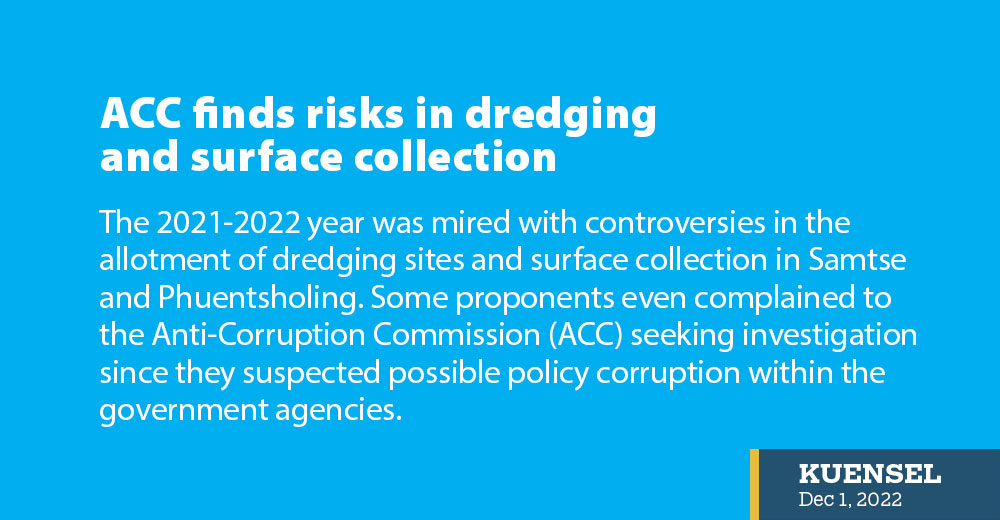Rinzin Wangchuk
The 2021-2022 year was mired with controversies in the allotment of dredging sites and surface collection in Samtse and Phuentsholing. Some proponents even complained to the Anti-Corruption Commission (ACC) seeking investigation since they suspected possible policy corruption within the government agencies.
In its annual report 2021-2022 released to the media on November 29, ACC highlighted some key findings from the system study conducted on the management of surface collection and dredging of RBM.
The commission found risks of regulatory corruption due to overlapping mandates and ambiguities in certain provisions of rules and regulations, collusion and bribery in the identification and assessment of the sites due to a lack of guidelines that provide a technical method and clear set of criteria.
The study also revealed that due to a lack of transparency, competitiveness and fairness in all the allocation methods adopted by the Department of Forests and Park Services (DoFPS), there are risks of abuse of function, conflict of interest and favouritism in site allocation.
Among the other risk factors the anti-graft agency highlighted were embezzlement and fronting in the exporting process as a result of non-maintenance of proper books of accounts by the exporters, lack of online payment system, standard measurement and standard measurement unit.
Arbitrary fixation of the selling price and risk of fronting, calculation of service charges and variations in the royalty collection, and lack of safe passage for export of boulders were other pertinent issues stated in the report.
The ACC also found that lack of collaborative monitoring with relevant authorities resulted in non-operation of awarded sites and non-monitoring of weighbridge offices, poor implementation and management of corruption prevention tools such as code of conduct, conflict of interest, gift, and grievance redressal mechanisms.
ACC conducted the study to examine the processes, procedures and practices instituted for surface collection and dredging of riverbed materials. It covered the related agencies including the DoFPS, Divisional Forest Offices in Gedu, Samtse and Sarpang, and other relevant stakeholders such as the Department of Geology and Mines (DGM), and Regional Revenue and Customs Offices in Gelephu, Phuentsholing and Samtse.
ACC’s recommendations
The Commission recommended the DoFPS reallocate all the existing and unoperated sites using the open auction method and rationalise the area of sites for allocation based on the resource potential, location of the sites and operational capacity.
It also recommended developing clear procedural guidelines for processing export approval, permits and related services to improve service delivery, fairness and transparency. “The DoFPS must explore ways to institute a standard and uniform system of RBM quantity measurement for efficient service delivery, reducing administrative burden and preventing corruption,” the report stated.
To resolve issues of overlapping issues, the ACC recommended the Ministry of Agriculture and Forests and the Ministry of Economic Affairs review the legal framework such as acts, rules and regulations and guidelines to draw legal coherence.
The Regional Revenue and Customs Office (RRCO), Department of Trade, Bhutan Chamber of Commerce and Industry (BCCI) and Bhutan Export Association were recommended to institute a proper system to ensure the selling price declared in the commercial invoice is the actual price received by the exporters.
The report also stated the RRCO must reinforce implementation and compliance with mandatory maintenance of proper books of accounts by all the RBM exporters and facilitate trade routes for the export of stones and boulders in collaboration with the Indian counterparts.
The DoFPS also recommended developing clear procedural guidelines for processing export approval, permits and related services to improve service delivery, fairness and transparency and adopt a uniform quantity measurement unit of RBM to reduce administrative burden and prevent corruption.
There are around 110 dredging sites under active operations across the country. Of that, 86 sites are handled by the Natural Resources Development Corporation Ltd (NRDCL).


